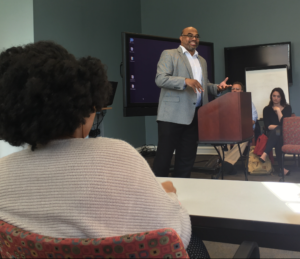
“If you want to be a popular writer, do not write about race and ethnicity, because you will always get attacked by people who don’t want to talk about race and ethnicity.”
Jesse Holland, Associated Press race and ethnicity reporter and author, spent an hour and 15 minutes with student journalists at the SEJC conference at the University of Mississippi in Oxford talking about how reporting on race and ethnicity is a changing field.
Holland said a common thread in his 300-400 daily emails is “Why do you always talk about race?”
“Usually I don’t respond, because the obvious answer is, ‘I’m a race and ethnicity writer. It’s sort of what I do,’” Holland said, chuckling. “But there’s a more important reason why there are race and ethnicity writers, and that reason is demographics.”
In the past, even when he worked on other beats, such as being a Supreme Court correspondent for seven years, Holland said he continued to write on his own time about these issues. When the race and ethnicity job opened, Holland said he “decided to take my passion and make it my job.”
The first few years were spent crossing the country, covering stories of tragedy and racial violence.
“After I started the job as race and ethnicity reporter for the AP, Ferguson happened,” Holland said. “So, I ended up spending about three weeks in Ferguson, Missouri, and then a few months after that is when Charleston [South Carolina] happened… And then after that, Baltimore happened.”
Holland said some of his favorite stories he’s done under the race and ethnicity beat have been about history.
“At heart, I guess you could say I’m a historian. I love writing about the past. I love looking at things that happened 100, 200, 300 years ago — and seeing how it still affects our lives today.”
By 2040, Holland said, the U.S. will become a minority-majority country.
“And that means, for the first time in its history, there will not be a majority race in America. There will only be a collection of minorities,” he explained. “No race will be more than 50 percent, and this is according to the U.S. Census.
“So frankly, as a business, that means as journalists we have to recognize that our readership is changing; that we will no longer be able to depend on one race to make up the majority of our readers. We now have to cover everyone. And you can’t cover everyone by writing one story.”
The second change, Holland said, is going to be covering white Americans as a minority.
“We’re having to learn now, as an industry, how to cover white Americans,” Holland said. “Race and ethnicity used to mean you cover everyone but white Americans. That’s changing.”
